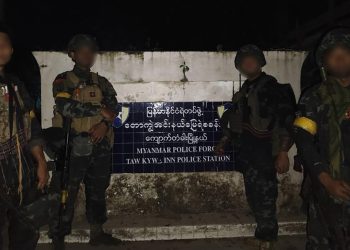Myanmar’s military regime has appointed a new ambassador to North Korea, restoring a controversial relationship between the two countries that ranges from trans-border assassination to military cooperation that prompted Western concerns of nuclear-technology sharing.
The junta’s Ministry of Foreign Affairs announced on Monday that Tin Maung Swe, Myanmar’s ambassador to China, will concurrently serve as ambassador to the Democratic People’s Republic of Korea (DPRK) – commonly known as North Korea.
Diplomatic relations between the two countries were first established in 1975 but then suspended by Myanmar following an assassination attempt by North Korean agents on then South Korean President Chun Doo-hwan during his official visit to Yangon in October 1983.
The president survived but 17 South Koreans and four Burmese officials were killed in the bomb attack, which severed diplomatic ties between Myanmar and North Korea for over two decades.
The two countries only re-established relations in April 2007 under Myanmar dictator Senior General Than Shwe, who appointed Thein Lwin as ambassador.
From this point, relations accelerate quickly.
Just over a year later in November 2008, a high-level Myanmar military delegation led by then junta No. 3 Thura Shwe Mann makes a secret seven-day visit to Pyongyang via Beijing, during which the two sides sign agreements to deepen military cooperation.
Shwe Mann and his delegation also visit Myohyang in North Korea, where secret tunnels had been built into the mountains to shield jet aircraft, missiles, tanks, and nuclear and chemical weapons. The visit arouses concerns, especially in the West, about the Myanmar military’s nuclear ambitions.
In 2012, while serving as Speaker of the Lower House under U Thein Sein’s quasi-civilian government, Shwe Mann claims the delegation to North Korea only observed an air defense system and signed a memorandum of understanding for cooperation between the two armies, but insists that nuclear weapons were not on the agenda.
Relations suffer another hiccup in 2017, when Myanmar expels North Korean diplomat Kim Chol-nam for suspected links with a company targeted by UN Security Council sanctions.
Kim reportedly belonged to the Korea Mining Development Trading Corporation (KOMID), which the UNSC had blacklisted in 2009 as a suspected channel for export of weapons and equipment for ballistic missiles.
Relations between the two countries seem to have normalized since Myanmar’s military coup in 2021.
In 2022, North Korean Ambassador Jong Ho-bom took a lead role in organizing a celebration by Yangon diplomatic families of the traditional water festival, according to regime mouthpiece The Global New Light of Myanmar. The ambassador joined the Yangon mayor and Yangon Region Chief Minister Soe Thein in handing cash awards to performers and splashing them with water.
On Wednesday, North Korean leader Kim Jong-un pledged his country’s “full and unconditional support” to Russia – a core ally of Myanmar’s junta – during a meeting with Russian counterpart Vladimir Putin against the backdrop of Moscow’s war on Ukraine.
Pyongyang has been conducting nuclear and missile tests since 2006, in defiance of UN Security Council sanctions.

















